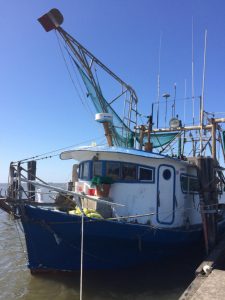Study: Fishing Households Experienced Depressive Symptoms Despite Social Support after Oil Spill
– JANUARY 31, 2020
Researchers conducted a survey of more than 2,500 U.S. Gulf Coast residents to learn how their lives have been affected since Deepwater Horizon. Survey results show that most people who had social support were less likely to screen positive for depressive symptoms in the years following the oil spill. However, that was not the case for fishing households, who were more likely to screen positive for depressive symptoms even though they reported higher levels of social support than other groups. Potential contributing factors for this result include links between fishers’ tight knit cultural community, whose work typically spans generations and permeates their non-work lives, and the greater economic losses they reported compared to those not tied to the fishing industry. The authors cautioned against drawing causal links because there is no pre-spill baseline data for comparison and there may be other confounding factors affecting mental health not assessed in their survey. These findings highlight a potential unique vulnerability associated with economic and cultural ties to renewable natural resources and a more complex association between social support and disaster recovery than is generally assumed.
The researchers published their results in Rural Sociology: Fishing households, social support, and depression after the Deepwater Horizon oil spill.
U.S. Gulf coast areas have experienced in the past fifteen years Hurricanes Katrina, Rita, Gustav, Ike, Isaac, Harvey, Irma, and Nate and the Deepwater Horizon incident. Two surveys conducted by federal agencies in the year following the oil spill suggested few to no significant mental health changes in the affected regions. However, other disaster research indicated differences between natural and technological disasters, with psychological effects from technological disasters unfolding over time and often distributing unevenly across groups.
Most research confirms that social support (interactions that provide individuals with assistance and embed them into a web of social relationships perceived to be loving, caring, and readily available in times of need) promotes resilience to traumatic events. However, studies following Deepwater Horizon and Hurricane Katrina suggest that belonging to a close-knit community can at times be a source of stress that can lead to maladaptive coping strategies. These results are consistent with earlier disaster research that focused on communities who rely on harvesting and using renewable natural resources and found that social support may affect fishers differently than other populations.
In 2016, the authors of this study assessed the longer-term health and wellbeing of adult residents in coastal Texas, Louisiana, Mississippi, Alabama, and Florida using the Survey of Trauma, Resilience, and Opportunity among Neighborhoods in the Gulf (STRONG). Their goal was to provide insights that would inform improved public health outcomes and promote resilience following future disasters.
The team’s survey results showed that for each unit change in economic loss there was an associated 34% increase in the odds of a positive depression screening. Following the oil spill, 46% percent of those with ties to the fishing industry reported losing money, 30% lost jobs or worked fewer hours, 11% suffered property damage, 30% reported that commercial fishing areas had sustained damage, and 22% filed an economic or property damage claim.
The authors noted an ongoing debate about measuring social support (perceived support versus actual activation of resources and support provided by types of ties/relationships). One of the most significant limitations, other than not having pre-spill data for comparison, according to the authors was a low survey response rate. They used a weighting strategy to yield generalizable inferences, though that did not eliminate the potential for non-response bias.
“After a disaster, assessing the human toll is much harder than measuring damages to physical infrastructure because fine-grained pre-disaster data simply don’t exist,” explained study author Melissa L. Finucane. “Secondary data about population or economic characteristics is available, but primary data from large, population-representative samples is typically too labor intensive to collect. We desperately need longitudinal surveys of people’s experiences so that we can fully understand factors that help or hinder community recovery from disasters.”
The authors suggest two potential intervention points to improve mental health outcomes as disasters unfold: 1) Target educational efforts for vulnerable groups (such as fishers) about depressive symptoms and available mental health resources; and 2) Identify influential peers within social networks to help shape or correct normative beliefs about mental health issues and healthcare options.
Data for this study are publicly available through the Gulf of Mexico Research Initiative Information & Data Cooperative (GRIIDC) at DOI 10.7266/n76971z0.
The study authors are Vanessa Parks, Tim Slack, Rajeev Ramchand, Leah Drakeford, Melissa L. Finucane, and Matthew R. Lee.
By Nilde Maggie Dannreuther. Contact maggied@ngi.msstate.edu with questions or comments.
************
This research was made possible in part by grants from the Gulf of Mexico Research Initiative (GoMRI) to the Consortium for Resilient Gulf Communities (CRGC).
The Gulf of Mexico Research Initiative (GoMRI) is a 10-year independent research program established to study the effect, and the potential associated impact, of hydrocarbon releases on the environment and public health, as well as to develop improved spill mitigation, oil detection, characterization and remediation technologies. An independent and academic 20-member Research Board makes the funding and research direction decisions to ensure the intellectual quality, effectiveness and academic independence of the GoMRI research. All research data, findings and publications will be made publicly available. The program was established through a $500 million financial commitment from BP. For more information, visit https://gulfresearchinitiative.org/.
© Copyright 2010-2020 Gulf of Mexico Research Initiative (GoMRI) – All Rights Reserved. Redistribution is encouraged with acknowledgement to the Gulf of Mexico Research Initiative (GoMRI). Please credit images and/or videos as done in each article. Questions? Contact web-content editor Nilde “Maggie” Dannreuther, Northern Gulf Institute, Mississippi State University (maggied@ngi.msstate.edu).






